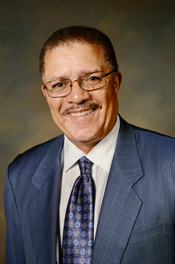An institution-builder leads new MSU School of Global Journalism
By Richard B. Muhammad -Editor- | Last updated: Oct 2, 2013 - 4:15:07 PMWhat's your opinion on this article?

|
His resume includes an impressive list of places where he has worked and done well—including inside a presidential administration.

DeWayne Wickham
|
His latest endeavor is serving as dean of the Global School of Journalism and Communication at Morgan State University, an historically Black university in his hometown of Baltimore, Md.
The school was set to officially open Oct. 3 with tours and a discussion of the civil rights movement with the 50th anniversary of the March on Washington and the 150th anniversary of the Emancipation Proclamation. The school has also assembled a talented group of professionals and practioners to serve on its faculty.
More valuable than his journalistic skill and prowess is new Dean Wickham’s mind and mission: Students must be creators of new ways to reach audiences not job seekers, must go beyond their professors and avoid the narrow trap of patriotic journalism, he says in an interview.
His observations are especially important as the country again talks of war with Syria. It was the mainstream media march behind Presidents Bush I and II that helped the country into costly and disastrous wars in Iraq and Afghanistan. It has been proven that high level lying and truth-twisting took America to war in part because the media was reduced to a lap dog press and not a watch dog press.
Dean Wickham isn’t one who marches to that drumbeat. Neither will his students, if they learn lessons he is willing to teach. Students need to be able to think and see globally, not taking sides, but understanding basics, like there have been abuses on both sides of Syria’s civil war, he says. Simply parroting the administration’s line that U.S. intervention is needed because President Bashar al-Asaad “killed his own people” is not enough, he adds. “We want to understand the world,” he says. That understanding can translate into good information that will allow people to make good decisions, he argues.
The facility at the new school is also first class, continues Dean Wickham, and includes 4 TV studios, with 2 studios equal to top flight commercial operations and others suitable for 60 Minutes-style interviews. Students will hone traditional skills but be trained to operate in the new digital world. But the present isn’t the most important thing for Dean Wickham, it’s the future.
Students must “think beyond what they know and what their professors know,” he says. With Blacks more likely to use smart phones, tablets and such technology what is the next thing needed to reach that audience where they are? he asks. Students in the School of Global Journalism are coming at the right time, no mold has been set that cannot be broken, he observes.
Dean Wickham wants a Bill Gates-type mentality that goes after new things, not just a find-a-job-mindset. Those who can get to the next level of touching readers, or content consumers, will be wealthy, he forecasts. But, Dean Wickham stresses, “Beyond wealth, they will have unimaginable influence.” The ability to inform, influence and inspire is the most important commodity a journalist can possess. With few willing to step outside the corporate-dominated point of view in American journalism, Dean Wickham’s vision is not only good for students and Morgan State University—it is good for a truth-starved world.
(Final Call editor-in-chief Richard B. Muhammad is a graduate of Morgan State University. He can be reached at editor@ finalcall.com. You can also follow him on Facebook and @RMfinalcall on Twitter.)
INSIDE STORIES AND REVIEWS
-
-
About Harriett ... and the Negro Hollywood Road Show
By Rabiah Muhammad, Guest Columnist » Full Story -
Skepticism greets Jay-Z, NFL talk of inspiring change
By Bryan 18X Crawford and Richard B. Muhammad The Final Call Newspaper @TheFinalCall » Full Story -
The painful problem of Black girls and suicide
By Charlene Muhammad -National Correspondent- » Full Story -
Exploitation of Innocence - Report: Perceptions, policies hurting Black girls
By Charlene Muhammad -National Correspondent- » Full Story -
Big Ballin: Big ideas fuel a father’s Big Baller Brand and brash business sense
By Bryan Crawford -Contributing Writer- » Full Story






 Click Here Stay Connected!
Click Here Stay Connected!








